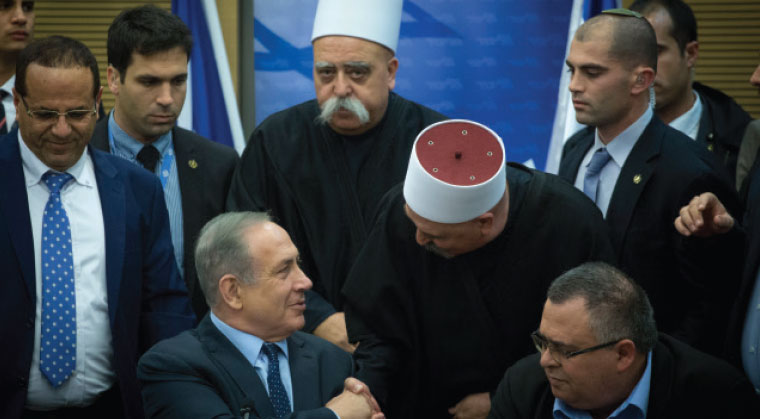Druze Protest Nation State Law


T
hree weeks after the Knesset passed the Nation-State Law, protests have emerged, most especially from Israel’s Druze community.
The Druze, members of whom serve side by side with Jewish soldiers in the Israel Defense Forces, have argued the new law has made them into second-class citizens. The spiritual leader of the Druze community in Israel, Sheikh Muafak Tarif, told Mishpacha that he met with the prime minister to ask him to change the law.
“I told him that we want to know what our status is under the Nation-State Law and how this is manifested in the status of the Druze community,” Tarif said. “Regretfully, Netanyahu said that he will form a team led by his chief of staff, but did not commit to changing the wording of the law.”
The prime minister met late last week with the leaders of the community, along with Druze MKs, to find a solution to the impasse. But toward the end of the session, before a scheduled photo op that was meant to declare an end to the crisis, Netanyahu left the meeting in anger. His office claimed that Druze Brig.-Gen. (res.) Amal Assad used the words “apartheid state” to describe Israel.
On Motzaei Shabbos, 20,000 Druze participated in a protest rally in Tel Aviv. The Druze spiritual leadership, which was asked a day later to return to negotiations with the Prime Minister’s Office, declared that it would continue to battle until the law has been amended or a new law has been passed that guarantees equality.
“We received an offer from the Prime Minister’s Office and we say that this offer is not sufficient, it does not answer our central demand, which is to guarantee equality for everyone,” the head of the Yarka city council, Wahib Habish, a member of the negotiating committee, told Mishpacha. “It is impossible to compensate us with benefits and closing gaps; that is a demand that exists irrespective of the Nation-State Law... The word equality must appear in the law or the amendment, otherwise any other framework will be irrelevant.”
So how will the crisis end? Members of the Druze community believe the prime minister will not change his position over the next few months, especially as elections approach in early 2019. They say Netanyahu plans to use the passage of the laws as a rallying cry for his supporters.
However, Israel’s government may also have to worry about a challenge from Israel’s High Court, as several Druze members of the Knesset have challenged the law. In an interview with Mishpacha, Justice Minister Ayelet Shaked said that if the High Court strikes down the law, it would constitute a political “earthquake.” In her view, the High Court does not have the authority to change Basic Laws.
“The Knesset is the legislative body, and is the one that defines and enacts the Basic Laws,” she said. “They have to explain the laws in accordance with the Basic Laws and I don’t believe there will be a majority on the High Court for such a decision,” she said.
The High Court will hear the Druze appeal in January 2019.
(Originally featured in Mishpacha, Issue 722)
Oops! We could not locate your form.













